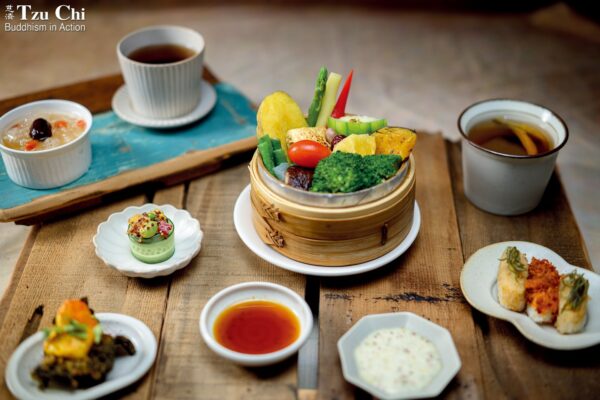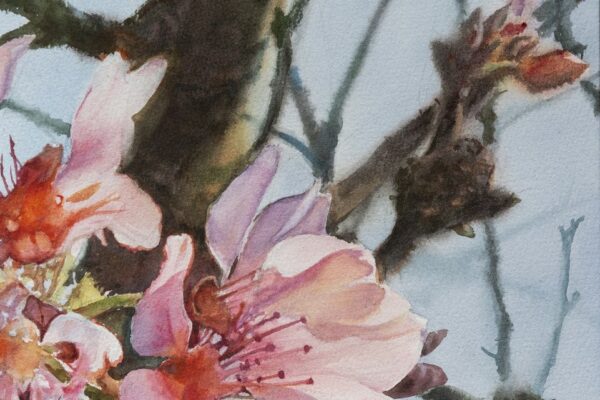Narrated by Jia Wen-yu
Compiled by Huang Xiao-qian
Edited and translated by Wu Hsiao-ting
Photos courtesy of Tzu Chi Indonesia
Tzu Chi Indonesia has forged a rich history over the past three decades, using the power of love to heal wounds and bring people together.
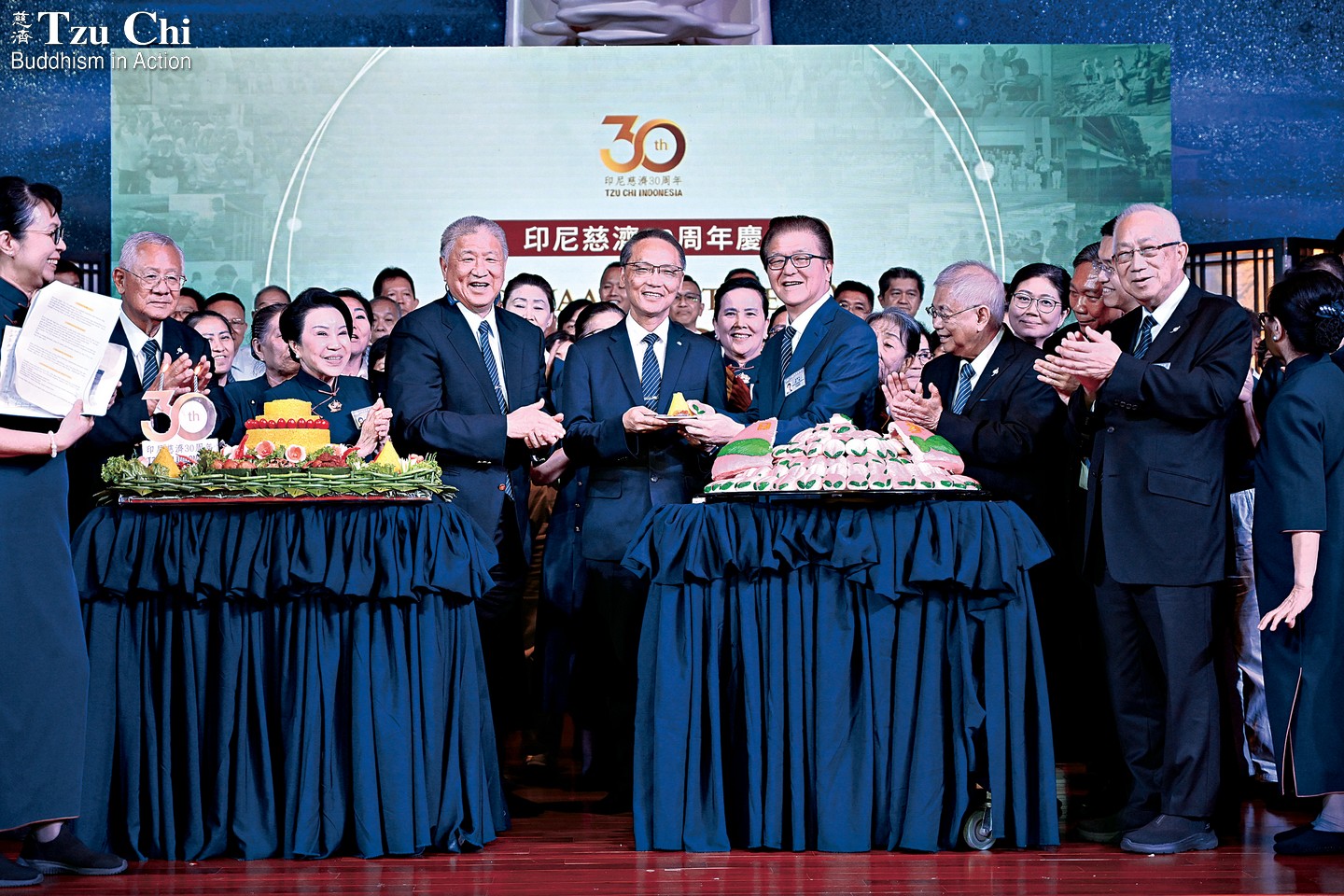
Sugianto Kusuma (left center) and Franky Oesman Widjaja (right center), deputy CEOs of Tzu Chi Indonesia, along with Yen Po-wen (顏博文, center), CEO of the Tzu Chi charity mission from Taiwan, participated in an event commemorating the 30th anniversary of Tzu Chi Indonesia in September 2023.
Tzu Chi Indonesia marked its 30-year milestone in 2023. I have been part of this incredible journey for 28 years, since 1995. I consider myself fortunate to be a part of Tzu Chi and believe that Indonesia is blessed because of the many volunteers working together here to serve our society.
Tzu Chi Indonesia currently has 18 branch offices and over 15,000 volunteers. In Jakarta, we have the distinguished Jing Si Hall, Tzu Chi schools, Tzu Chi hospitals, and a TV station. These are developments I never could have imagined when I first became a Tzu Chi volunteer.
The first large-scale medical program
Liu Su-mei (劉素美) is a Tzu Chi volunteer who initiated Tzu Chi activities in Indonesia in 1993 with the wives of some Taiwanese businessmen. Their efforts laid the groundwork for Tzu Chi’s presence in the country. Without Sister Su-mei’s courageous commitment, the Tzu Chi organization we have in Indonesia today would not exist. For this reason, those of us with Tzu Chi Indonesia are all immensely grateful to her. Liu would go on to become CEO of Tzu Chi Indonesia.
Our efforts at first were centered on helping needy families, including providing school fees for underprivileged children. The first disaster relief effort we undertook took place after the eruption of Mount Merapi in Yogyakarta in November 1994. We raised money and donated it to the local government, enabling the construction of 12 houses for people forced to relocate due to the disaster.
In 1995, we started a collaborative program with the health bureau of Tangerang, in the province of Banten, to combat tuberculosis. It was during this time I learned that Indonesia held the second-highest global ranking for tuberculosis cases. Fortunately, the disease wasn’t difficult to treat. With consistent medication, proper nutrition, and a regular lifestyle, recovery was assured in just six to nine months.
In addition to medication, Tzu Chi provided powdered milk, mung beans, rice, and other food to supplement the nutrition of patients in the program. Our volunteers conducted biweekly visits to monitor patients’ weight, checking for signs of improvement due to their increased nutrition. During such visits, we sometimes came across patients who hid mineral water within their clothing during weight checks, thus falsely showing a greater weight gain. This was either because they couldn’t afford the luxury of adequate rest as prescribed by the program or had reserved nutritious food from Tzu Chi for their children. When we encountered patients doing this, we encouraged them to prioritize their recovery instead.
At the time, we were unfamiliar with tuberculosis protocols, such as wearing masks and gloves for close contact. When members of the Singapore chapter of the Tzu Chi International Medical Association saw pictures of us holding patients’ hands, they urged us to prioritize the safety of ourselves when caring for others. Only then did we recognize the dangers of the bacteria.
The tuberculosis treatment program continued until 1999, providing care for a total of 1,183 patients. It marked our first major medical care effort in Indonesia and profoundly impacted me. Through this experience, I gained a deep understanding of Master Cheng Yen’s teaching: “When others are hurt, we feel the pain; when others suffer, we feel the sorrow.”
Back then, I worked as the secretary for Mr. Eka Tjipta Widjaja (黃奕聰), the Indonesian-Chinese founder of the Sinar Mas Group. I introduced Tzu Chi to him. On May 9, 1998, Mr. Widjaja, accompanied by his wife, Trini Dewi Lasuki, and son, Franky (黃榮年)—who would later become one of the two deputy CEOs of Tzu Chi Indonesia—visited Master Cheng Yen in Taiwan. Just a few days later, on May 13, riots erupted in Jakarta, with the primary targets of the violence being ethnic Chinese Indonesians.
In response to the anti-Chinese sentiments, Master Cheng Yen advised us to resolve hatred with love. Consequently, we distributed rice to the military and police, who played a crucial role in maintaining public order during the riots, as well as to needy residents of Jakarta and its surrounding areas. With the support of Brother Franky and the Sinar Mas Group, along with assistance from the military and police, we successfully distributed 1,100 tons of rice.
I vividly recall the severity of the situation during those tense times. On one occasion, I overheard a Sinar Mas Group employee telling Brother Franky that someone else had flown to Singapore for his safety. As an ethnic Chinese, I felt overwhelming fear and a strong inclination to seek refuge abroad too. Hence, I was very grateful to Mr. Widjaja, Brother Franky, and others for staying put and not leaving Indonesia.
Tzu Chi Indonesia partnered with the health bureau of Tangerang, in the province of Banten, to launch a project in 1995 aimed at combating tuberculosis. Jia Wen-yu (賈文玉, center), the narrator of this article, is pictured here explaining the project to villagers.
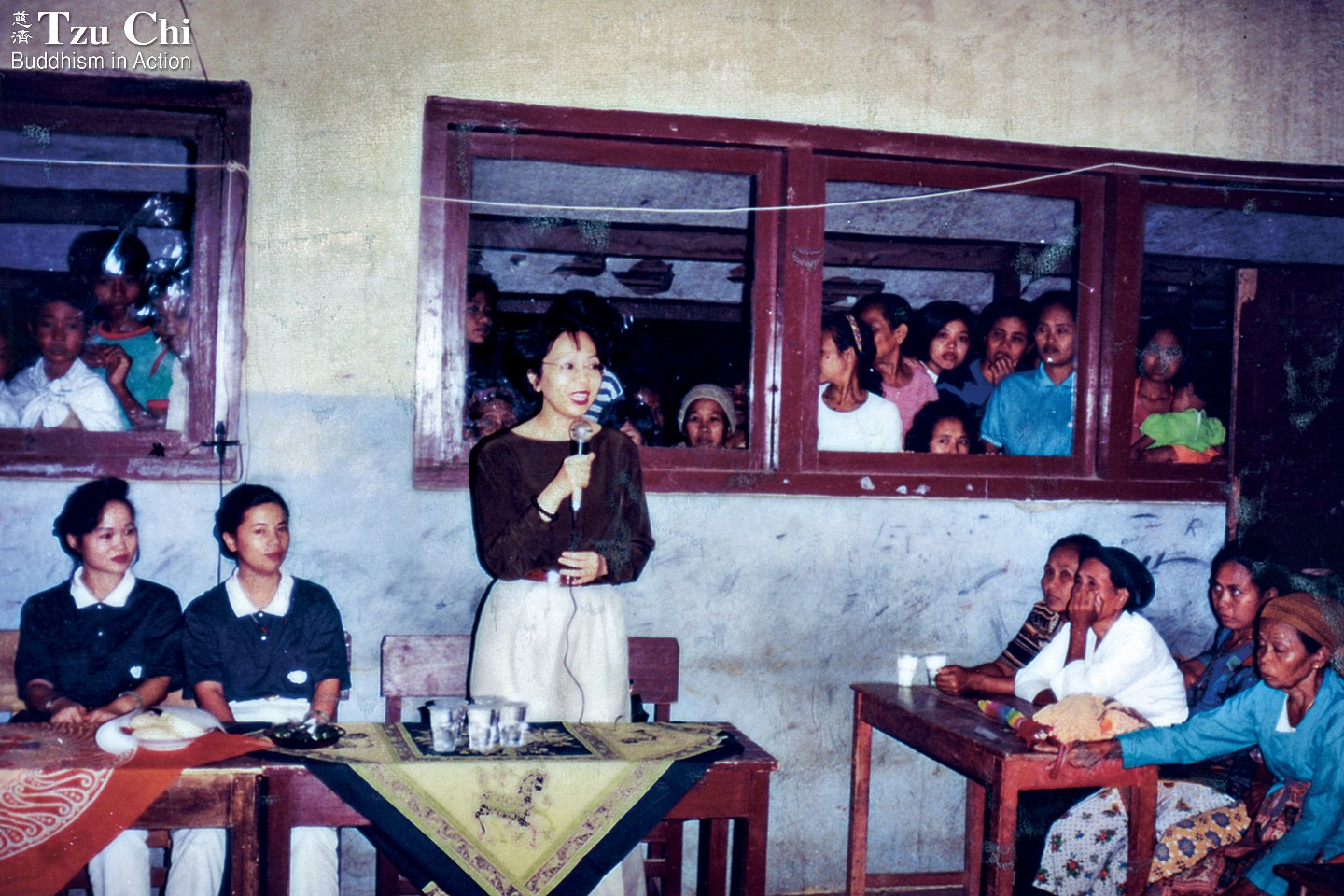
The Angke River
In January 2002, Jakarta was hit by a devastating flood, with the most severe impact occurring downstream of the Angke River. This section of the river was heavily polluted with garbage, and its banks were densely populated with impoverished residents living in illegally constructed houses. Our volunteers ventured into flooded areas to distribute hot meals and provide free medical services to victims. One day, Mr. Widjaja said to me, “Wen-yu, I would like to invite Tzu Chi brothers, sisters, and the medical team for a meal.” He was aware of Tzu Chi volunteers’ continuous care for survivors, and with the Chinese New Year approaching, wanted to do something for us.
I will always remember the day that meal took place, February 23, 2002, a Saturday. We dined at a restaurant owned by Sugianto Kusuma (郭再源). Sugianto—who would later become another deputy CEO of Tzu Chi Indonesia—was also invited to the gathering; it was the first time he had participated in a Tzu Chi-related activity. Brother Stephen Huang (黃思賢) came all the way from Taiwan for the occasion. During the meal, Mr. Widjaja asked, “Can Tzu Chi provide more assistance to the flood-affected residents?” He had seen on television that, even nearly two months after the flooding, many people were still living by the roadside without proper shelter. Brother Huang responded that further relief actions, especially on a large scale, would require approval from Master Cheng Yen.
Mr. Widjaja, feeling for the victims, decided to visit the Master in Taiwan. He visited the Master on March 6, accompanied by Brother Franky, Sister Su-mei, and me. During our meeting, the Master said to Mr. Widjaja, “I’d like to use your influence to mobilize entrepreneurs in Indonesia to clean up the disaster area.”
When he returned to Jakarta, Mr. Widjaja immediately called for a meeting with all Tzu Chi volunteers to discuss how to clean up the disaster area. The next day, he invited Sugianto to his office and asked, “Master Cheng Yen wants us to clean up Jakarta together. Are you willing to help?” Sugianto immediately agreed.
During the Dutch colonial period in Indonesia, many ethnic Chinese people were killed by the Dutch East India Company in a massacre and dumped into the Angke River, turning it red; hence its name Angke (Ang means “red” in Hokkien). We never imagined that as Chinese, we would have the opportunity to contribute to the cleanup of the river and build new housing villages for the relocation of people living on its banks. We aspired to transform the river into a symbol of love and warmth.
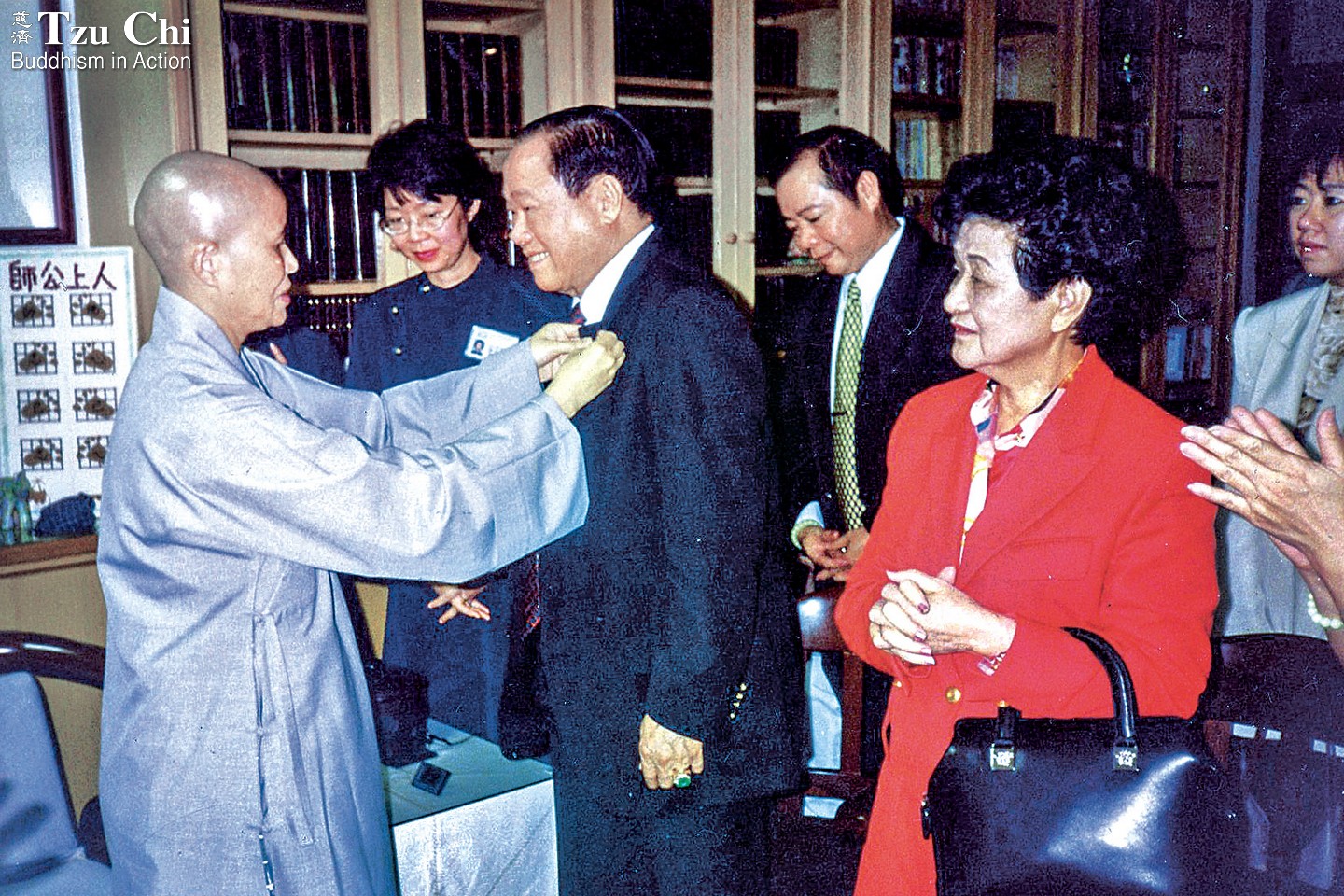
Eka Tjipta Widjaja (center), the founder of the Sinar Mas Group, and his wife, Trini Dewi Lasuki, visited Dharma Master Cheng Yen in Hualien, Taiwan, in May 1998.
Safer homes
At first, many residents along the banks of the Angke River were unwilling to relocate. To persuade them, we stressed that the move wouldn’t just be to a safer place but also to a better environment, complete with a school and hospital, creating a conducive setting for their children to grow up in.
Tzu Chi provided a subsidy of 500,000 Indonesian rupiah (US$32) for each household agreeing to relocate, helping them to temporarily rent places to live. To fund the housing project, we launched a fundraising effort in Indonesia. The cost for each housing unit was 50 million Indonesian rupiah (US$3,160), and Tzu Chi was planning to construct more than a thousand such housing units. (This would be Great Love Village I, completed in 2003; a second Great Love Village would follow, completed in 2005.)
Brother Sugianto had just joined Tzu Chi at the time, but was already a very committed supporter of the foundation’s work. He proposed a plan: if Tzu Chi couldn’t raise enough for the project, he would shoulder half of the shortfall, and Brother Franky would shoulder the other half. Franky readily agreed to the plan. Later we discovered that the Sinar Mas Group, owned by Franky’s family, was going through a particularly difficult period, making his offer to help even more benevolent.
We are also deeply thankful to Brother Stephen Huang, who visited Jakarta eight times during the Angke River cleanup. One evening, when I picked him up at the airport, he expressed a desire to see the river. I thought, “It’s so late; what’s there to see at this time?” Nevertheless, I took him there. We had just cleared tons of garbage from the river at that point, but an unpleasant odor lingered. As soon as I stepped out of the car, I instinctively covered my nose. Surprisingly, as if the bad smell didn’t exist, Brother Stephen calmly remarked, “Doesn’t this scene resemble Venice? It would be even more romantic if someone were playing a guitar by the river.” Upon hearing this, I lowered my hand from my nose. I realized that he was moved by the fact that we had undertaken such a significant charitable project to clean up the river.
In May 2023, Brother Hong Tjhin (陳豐靈) visited my office and mentioned having a meal the day before with the acting governor of Jakarta, Mr. Heru Budi Hartono. The acting governor had been a government employee in North Jakarta two decades ago, during the Angke River cleanup and relocation of nearby residents. He spared no effort at the time to assist Tzu Chi. Brother Hong was equally dedicated—all for the betterment of Jakarta and the welfare of the underserved people we were helping.
Brother Hong shared, “I told the acting governor during the meal that Great Love Village I would celebrate its 20th anniversary in August. The governor responded emotionally, ‘So soon?’” Then, in the midst of his account to me, Brother Hong suddenly fell silent. I asked him, “Are you crying?” He nodded and replied, “Yes.” Reflecting on that memorable time, how could he not be filled with emotion?
Great Love Village I celebrated its 20th anniversary on August 26, 2023. Residents took the stage during the celebration event to share the positive transformations in their lives after moving into the village. Their children were thriving. This reinforces my belief that every endeavor we undertake in Tzu Chi is destined to yield fruitful outcomes, because our actions are not for personal gain but for the well-being of society.
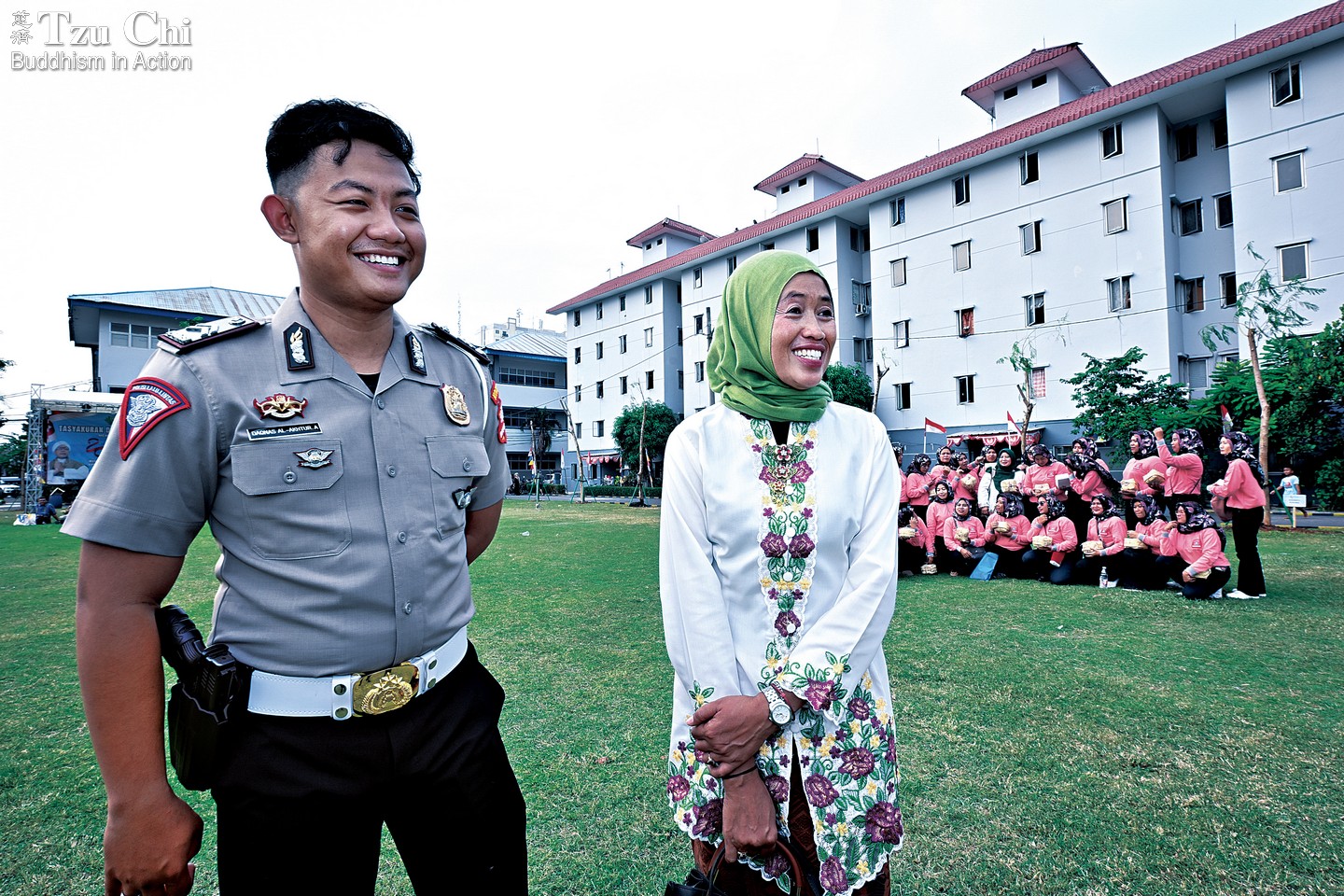
Dagnas Al-Akhtur A. (left) grew up in Great Love Village I in Cengkareng and is now a police officer. His mother, Tutin Rahayu (right), is deeply grateful for the better life they’ve had since moving into the village.
The Angke River used to be called the Black Heart of Jakarta until it underwent cleanup. Illegal structures were built along the riverbanks. Though residents relied on the river for their daily water supply, it also became a dumping ground for wastewater and garbage.
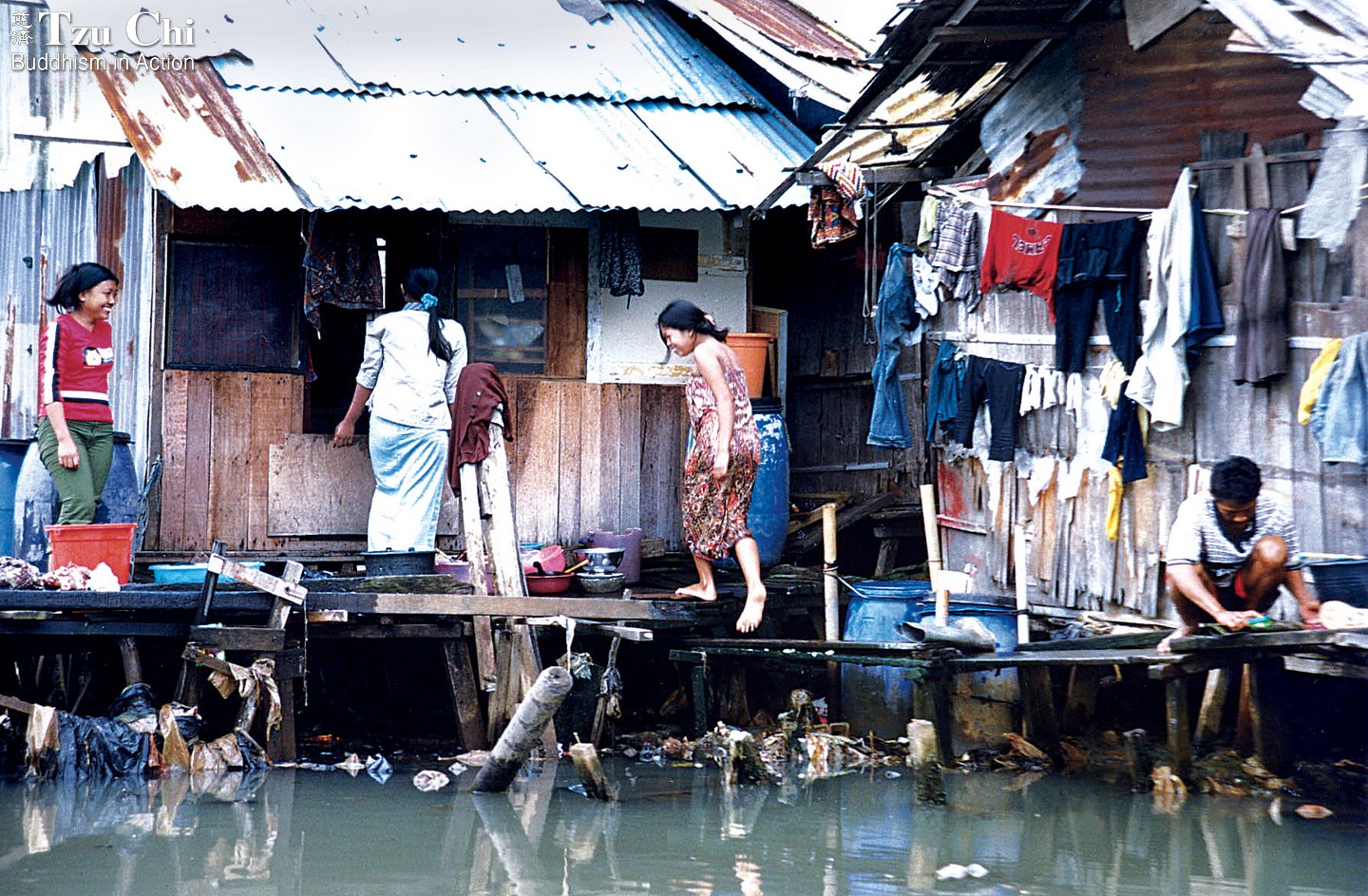
Mr. Heru Budi Hartono (center), the acting governor of Jakarta, is seen here attending the celebration of the 20th anniversary of Great Love Village I in Cengkareng in August 2023. He dedicated considerable effort to aiding the construction efforts of the village.
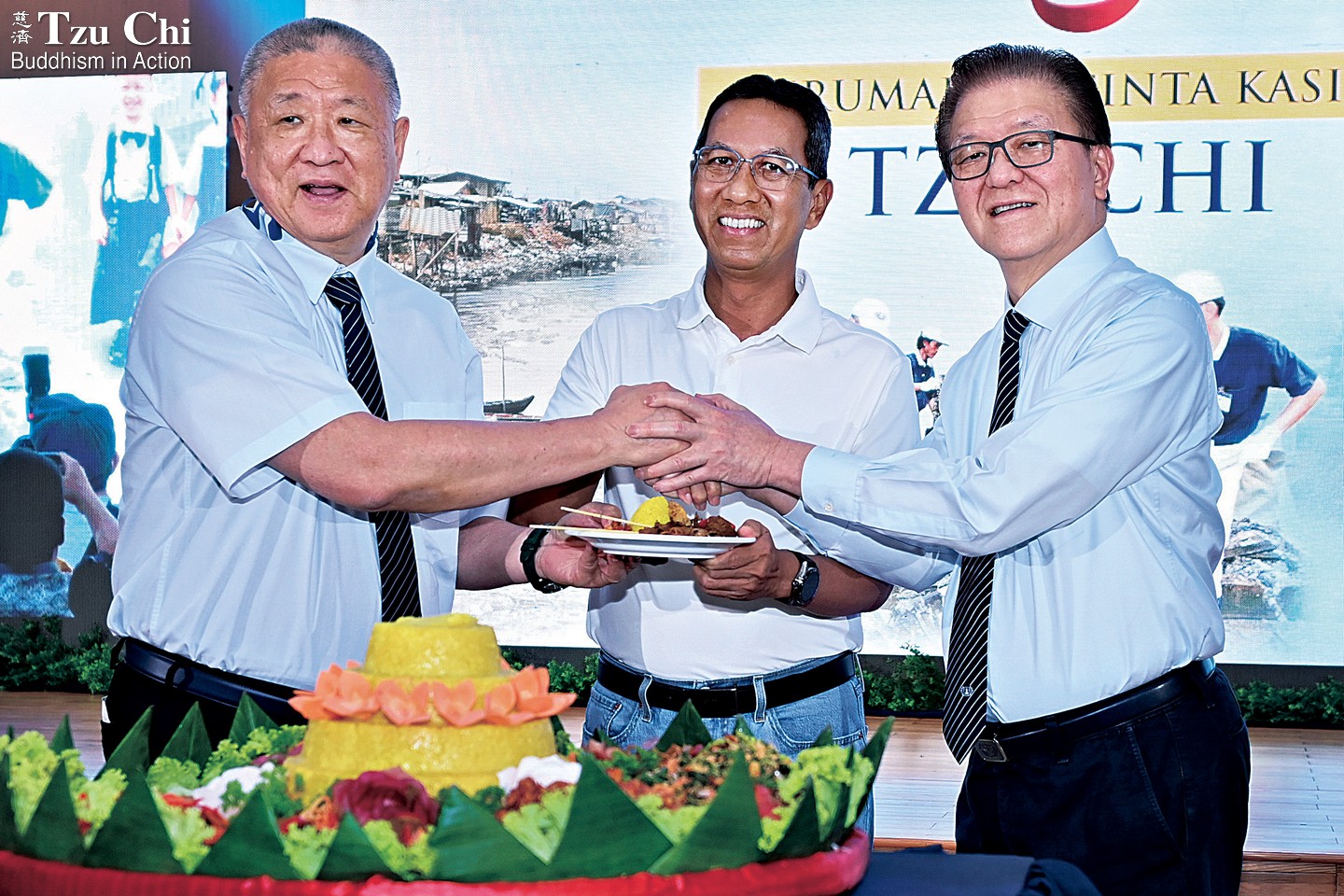
Distributing 50,000 tons of rice
From 2003 to 2007, Tzu Chi Indonesia distributed 50,000 tons of rice to those in need, sowing the seeds of Tzu Chi’s compassion across various regions in Indonesia.
This initiative came to be after Brother Sugianto accompanied several entrepreneurs from Indonesia to Tzu Chi headquarters in Taiwan. There, they learned that Taiwan’s Council of Agriculture (now the Ministry of Agriculture) was allocating 100,000 tons of rice to Tzu Chi for distribution to needy people outside of Taiwan. When Master Cheng Yen inquired about Indonesia’s needs, Brother Sugianto promptly responded with “50,000 tons.” When the news reached us in Jakarta, the prospect of distributing such a vast quantity left us feeling overwhelmed even before we started the work.
Each household was slated to receive 20 kilograms (44 pounds). This meant that the 50,000 tons of rice would need to be distributed to 2.5 million households. The prospect of such a large-scale distribution was daunting, especially with the limited volunteer manpower we had at the time. Even so, Brother Sugianto persevered. He was taking into account that the Indonesian economy had not fully recovered after the anti-Chinese riots, and that many people were still grappling with difficulties in their lives.
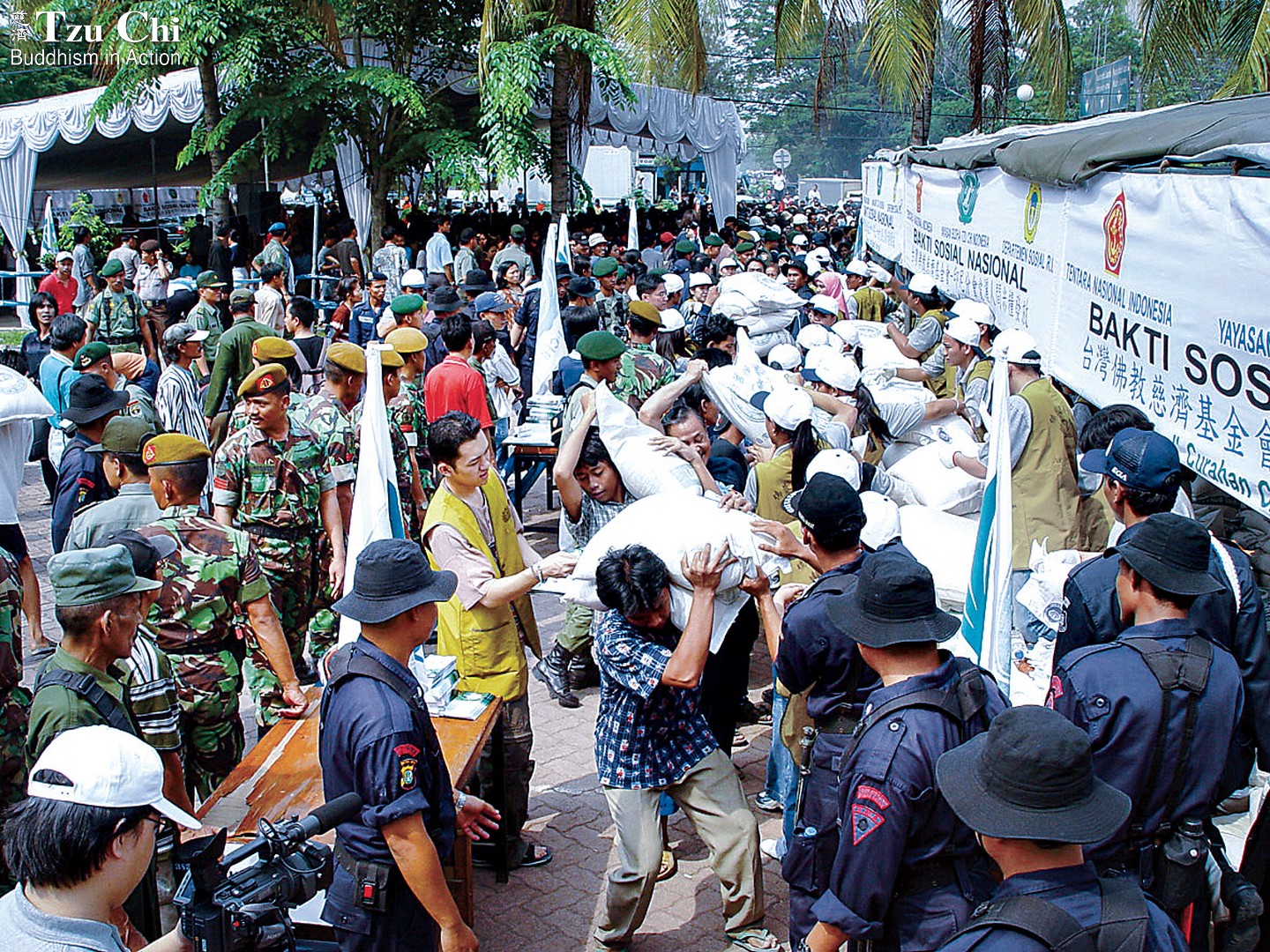
From 2003 to 2007, Tzu Chi volunteers in Indonesia distributed 50,000 tons of rice provided by Taiwan’s Council of Agriculture to local needy people.
Shipping the 50,000 tons of rice from Kaohsiung, southern Taiwan, to Jakarta alone cost one million U.S. dollars. Thankfully, ten entrepreneurs generously shared these expenses. Transportation costs from Jakarta to other parts of Indonesia were covered by local businesspeople in each district. I commend everyone who made the distribution effort possible. Not every country was as fortunate as Indonesia. In some countries, volunteers wished to distribute rice but couldn’t afford transportation costs.
It’s also worth mentioning that the distribution of 50,000 tons of rice became an event that attracted many new volunteers to Tzu Chi. Many corporate leaders, including Brother Sugianto, Sister Li Li-ying (李麗英), Brother Franky, Sister Zou Li-ying (鄒麗英), Brother Fang Zhong-kun (方忠坤), and others, assigned their employees to assist. For example, Brother Franky instructed his employees from the Sinar Mas Group to handle warehouse storage, transportation, coordination with local governments, and even the actual distributions.
Distributing claim vouchers to potential recipients presented a significant challenge itself. Originally, during the preparatory meeting, it was agreed that distribution teams would consist of four people. But once on-site, the four-person teams split up, with individuals working alone, because the area we had to cover was so big. Working in slum areas made us anxious, and we worried about being unable to locate other volunteers after completing the distribution. We were also anxious when we ran out of vouchers for needy families while we waited for more to arrive. If we had extra claim vouchers, we took motorcycle taxis to nearby villages to continue distributing.
That was my first time riding a motorcycle taxi. I held the claim vouchers in one hand. In the other, I gripped the passenger grab handle and my Tzu Chi bag. That motorcycle ride was an unforgettable experience.
During the distribution period, something else left a deep impression on me. Brother Franky was putting a lot of effort into helping with the distributions. One day, his father, Mr. Widjaja, said to me that Franky was dedicating so much time to the distributions that his mother and wife were unhappy, as it reduced his time with them. I promptly went to Franky’s office and requested that he not participate in the distribution events any longer. To my surprise, he responded, “Please tell my dad that I show up in the office every morning at eight and work into the night. It can be stressful. While my siblings have hobbies like golf, fitness, and surfing [to help them deal with their work pressure], I don’t. My only passion lies with Tzu Chi.” When I conveyed this message, Mr. Widjaja suddenly adopted a very gentle tone and said, “Forget about it then. Let him be.”
The Indian Ocean tsunami struck in December 2004 with devastating consequences. Aceh Province in Indonesia was one of the hardest-hit areas. There were many fatalities and the infrastructure of the area suffered severe damage (as seen in photo 1). In response, Tzu Chi built homes for those who lost their residences in the disaster. The inauguration of Great Love Village I in Aceh took place in 2005, and then-President Susilo Bambang Yudhoyono (pictured in the center-right in photo 2) attended the event.
Photo 2 by Yan Lin-zhao
The 2004 Indian Ocean tsunami
In 2004, the Indian Ocean tsunami wreaked havoc in southeast Asia, including in Aceh Province, Indonesia, resulting in over 200,000 fatalities. Brother Sugianto and his family were in Shanghai, China, at the time of the tragedy, December 26. When he learned about the disaster, he hastily returned to Jakarta. On the 28th, he boarded a chartered flight with several other volunteers, transporting relief supplies to the disaster area. Witnessing the enormity of the catastrophe and the people at the airport, barefoot and scrambling to board planes, Sugianto was struck by life’s impermanence. He reflected on how, in the face of death, we can take nothing but our karma.
Fear initially gripped me as I headed to Aceh for relief efforts. Images from TV reports—the countless lives lost, the families shattered—haunted my thoughts. Despite my inner turmoil, I pressed on. Once in the disaster zone, I sensed the somber atmosphere but also witnessed the courageous dedication of fellow Tzu Chi volunteers. Sister Qiu-lan, for instance, served as a culinary volunteer there for three months. Several male volunteers not only engaged in disaster relief but also assisted in the handling of deceased bodies, embodying the true spirit of compassion.
This calamity was a massive tragedy of our time, prompting Tzu Chi to construct 2,700 housing units in Aceh for those rendered homeless by the disaster. We are grateful for Brother Sugianto’s communication with the local governments during our aid efforts and to Brother Franky for coordinating the storage and transportation of thousands of tons of relief supplies. Our appreciation also goes to Master Cheng Yen, and to the global Tzu Chi community for their street fundraising efforts, which contributed to this collective project.
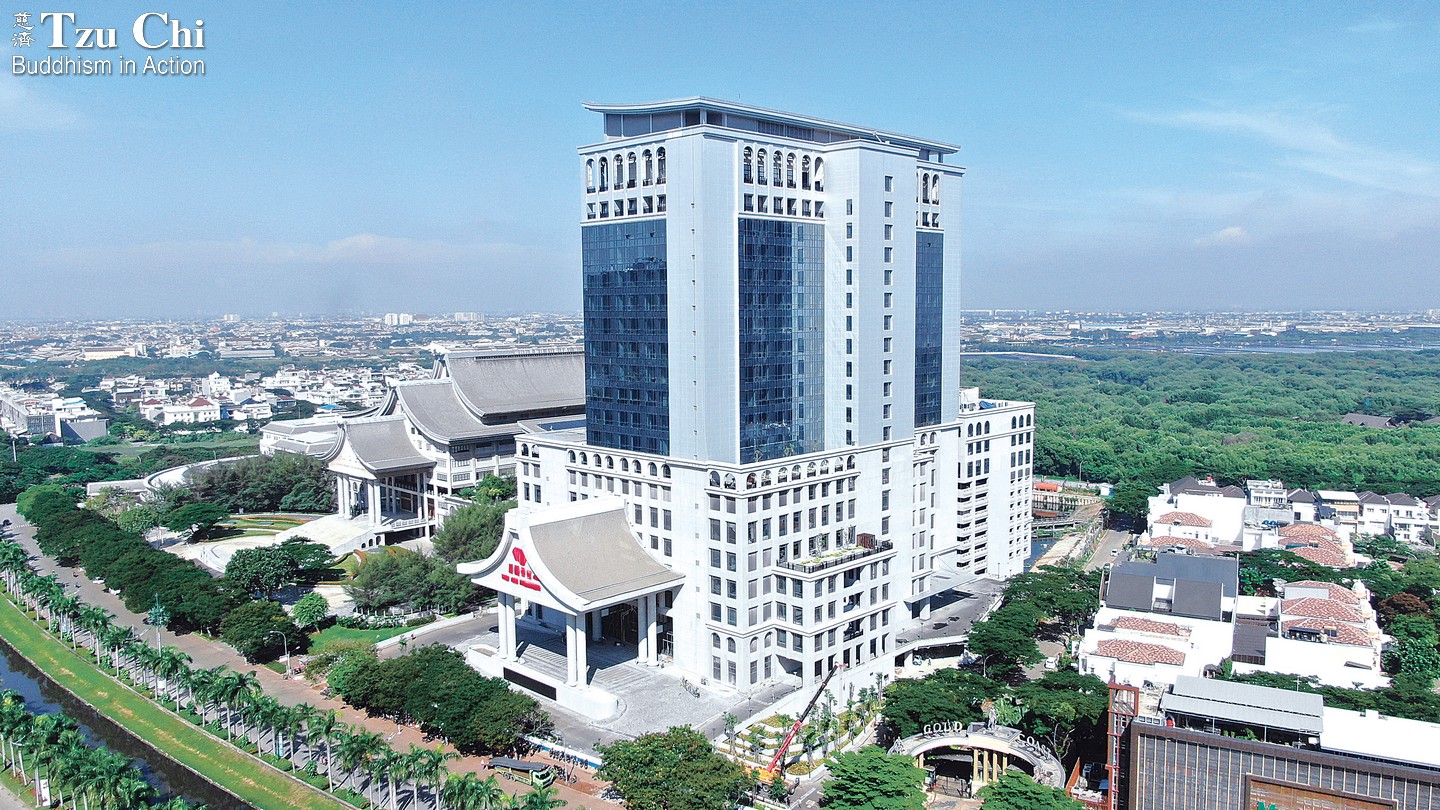
Tzu Chi Hospital Indonesia was officially inaugurated in June 2023.
Anand Yahya
The COVID-19 pandemic
The COVID-19 pandemic brought about movement restrictions and impacted the world for more than two years. Despite the challenges caused by the outbreak, Tzu Chi Indonesia formed good affinities with many people during this time. For instance, we donated a substantial amount of protective clothing, rapid test kits, medications, and more to medical facilities nationwide. Even the remote Nias Island received assistance. Tzu Chi’s outreach was made possible through the unity and cooperation of all volunteers in Indonesia. We thank Sister Su-mei for her unwavering dedication in overseeing our operations during this period.
On June 14, 2023, President Joko Widodo graced the inauguration ceremony of Tzu Chi Hospital Indonesia. This occasion filled us all with joy and honor. Tzu Chi hospitals in Indonesia stand as the only medical institutions in the country with volunteers assisting patients and their families. We sincerely invite more people to join us as hospital volunteers. We not only contribute to the well-being of others within the hospital setting, but also deepen our understanding of the fundamental aspects of the human experience—birth, aging, illness, and death.
Over the past 30 years, those of us with Tzu Chi Indonesia have experienced much, gaining deep insight into the suffering as taught by the Buddha. Through learning to give and care for others, we have grown and enriched our lives with greater meaning. I am deeply grateful for the opportunity to cultivate myself within Tzu Chi. I pledge to follow the Bodhisattva Path life after life.
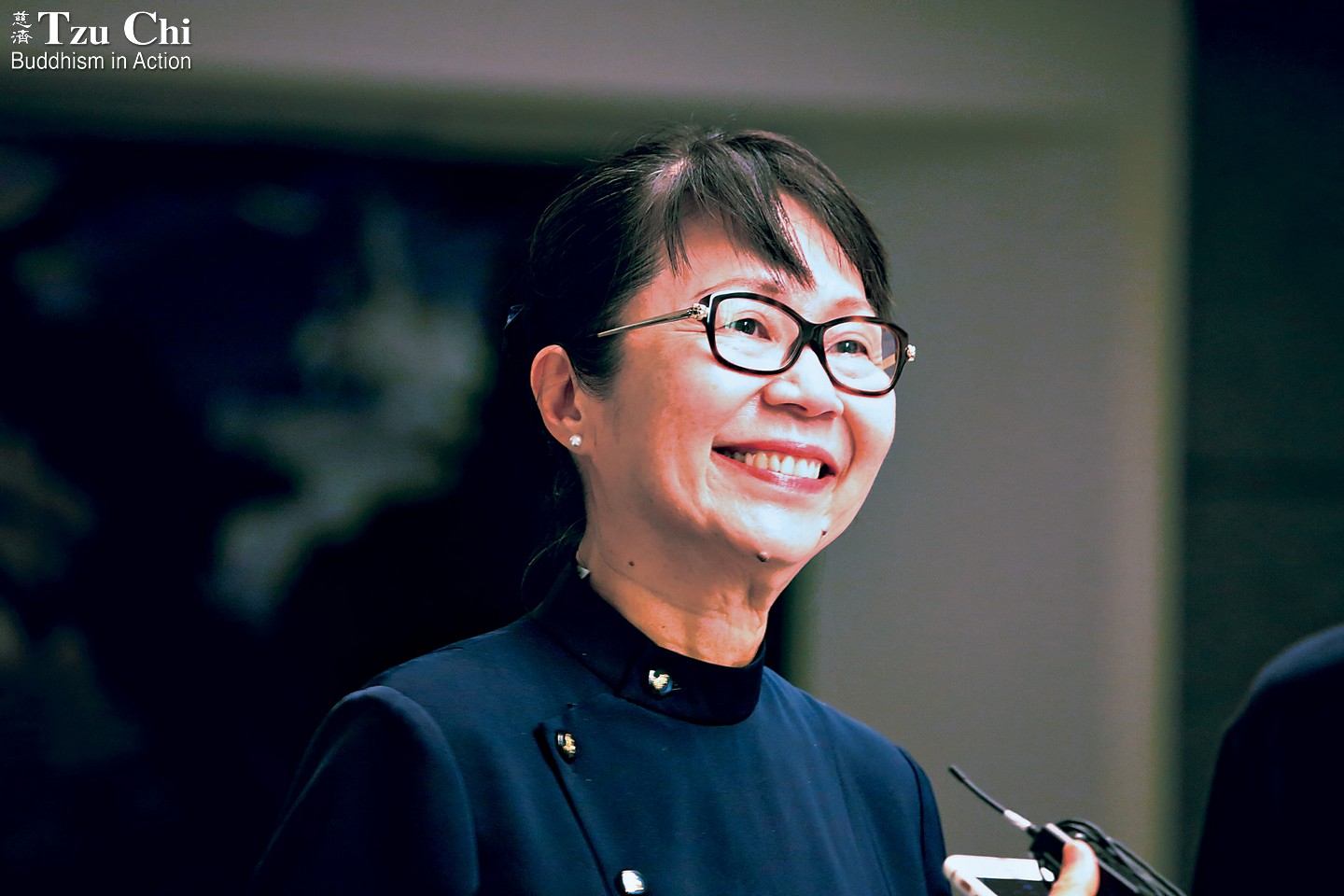
Profile of Jia Wen-yu
- Born in 1957. Became the first certified Tzu Chi volunteer in Indonesia in 1995.
- Joined the Sinar Mas Group in 1992. Introduced Tzu Chi to Mr. Eka Tjipta Widjaja, the founder of the Group, who, in turn, introduced the charity foundation to many other entrepreneurs in Indonesia.

